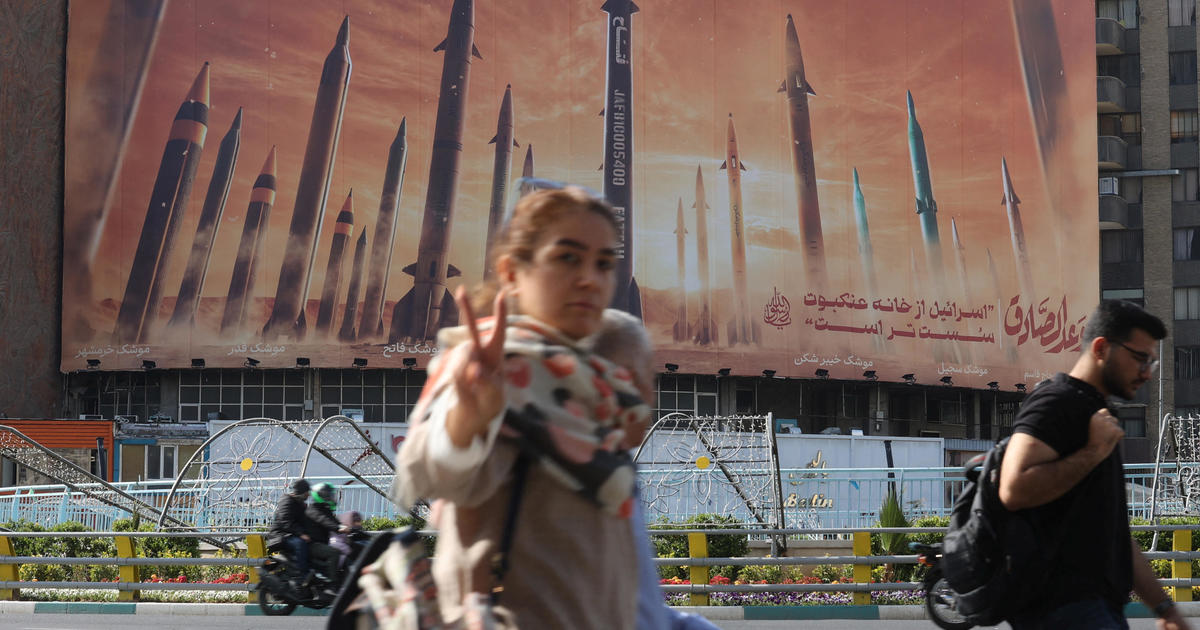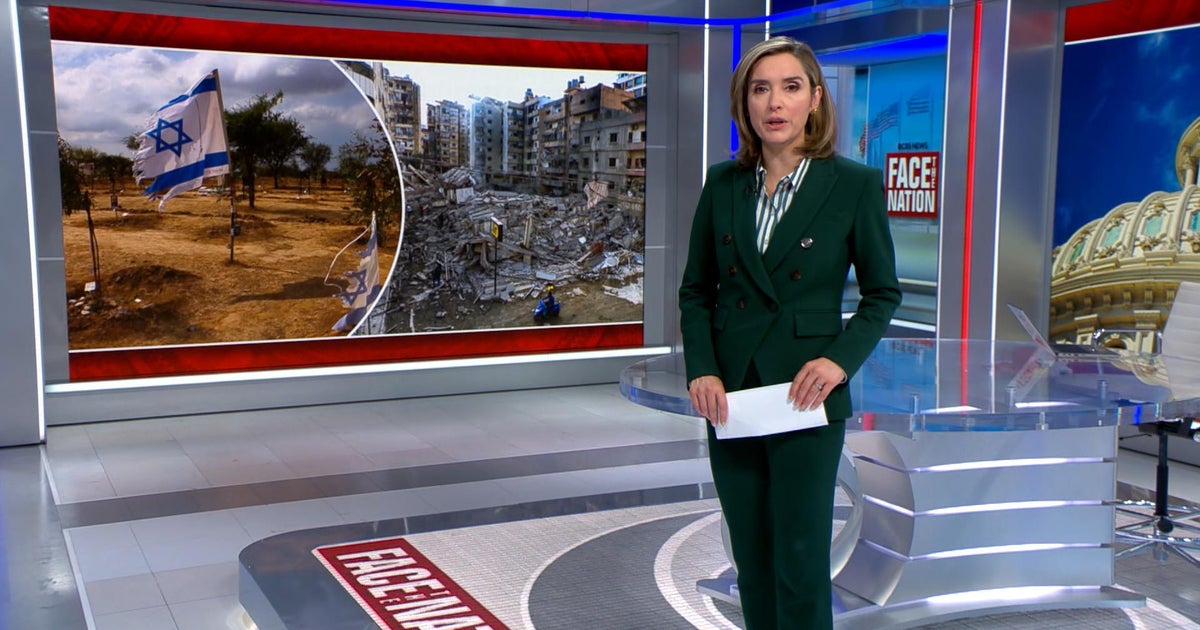CBS News
What’s the mood in Iran as Israel mulls its response?

Tehran — Not long after Iranian state TV informed the nation that the Islamic Revolutionary Guard Corps had launched hundreds of drones and missiles, people poured into the streets in Tehran and other cities to show their support for Iran’s first-ever direct military action against Israel.
Iran had vowed to retaliate for the killing of seven IRGC officers about two weeks earlier, in an airstrike that hit an Iranian consulate in Syria’s capital. Israel hasn’t acknowledged carrying out that strike, but it hasn’t denied it, either.
The world is still waiting to see four days later how Israeli Prime Minister Benjamin Netanyahu’s government will respond to the Iranian attack, which caused “very little damage,” according to the Israel Defense Forces. The IDF said 99% of the 300-plus weapons launched were intercepted or fell out of the sky before they even reached Israeli territory, thanks to the country’s robust air defenses and help from its U.S. and European allies.
As the U.S. works to prevent Israel’s ongoing war against the Iran-backed Palestinian group Hamas from spreading into a much wider regional conflict, President Biden urged his Israeli counterpart right after the Iranian attack was thwarted, “to think about what that success says all by itself to the rest of the region,” according to National Security Council spokesperson John Kirby.
Kirby said the U.S. was “working with international partners to work up options to hold Iran appropriately accountable.”
But the White House has made it clear that the decision on how to retaliate will be Israel’s to make, and that leaves plenty of room for anxiety across the tinderbox Middle East. But not too much, it would seem, in Iran.
Life goes on in Iran
Since the Iranian attack on Israel, there have been no signs that the Islamic republic is preparing for a war. Far from political and military leaders running for bunkers in fear of an Israeli reprisal strike, there have been no military drills, schools remain open. Iranian authorities haven’t imposed any restrictions on air traffic.
Majid Asgaripour/WANA/REUTERS
Even ordinary Iranians appear relatively relaxed. There has been no obvious rush on supermarkets by people trying to stock up on essentials, and everyday life has gone on largely as normal.
The only direct impact thus far has been a predictable hike in the value of foreign currencies compared to Iran’s. The ensuing rise in some commodity prices has brought back long lines for gas, but those are familiar in the heavily-sanctioned nation.
But there is cause for concern among Tehran’s ruling class, and most of it’s rooted in those financial factors. Stifled under some of the toughest international sanctions imposed by the U.S. and its allies on any nation, Iran’s economy has been crippled for years. There’s sky-high inflation and Iran remains mired in a deep recession.
Iran’s economic woes
For Iran’s leaders, the economy is likely a first concern. A wave of resentment over the country’s dire finances and its strict interpretation of Islamic law has manifested in political unrest and street protests in recent years. Some have even seen people chanting risky calls for a change of leadership.
But Iranian political analyst Hadi Mohammadi told CBS News he believes Iran walked the right line with its attack on Israel, and Mohammadi says Iran’s leaders have their nation’s backing.
“The Iranian people’s social behavior against common enemies in wars and frictions has proven that they mostly stay united,” he told CBS News, suggesting a sense of national unity in the face of a perceived foreign threat is greater than any quarrel Iranians might have with their own leaders.
He pointed to opinion polls carried out just days before the Iranian reprisal against Israel that showed a majority of people supporting the looming operation.
“Even some of them who were critical of the administration were supportive of a military response, so that the enemy would not be persuaded to repeat its actions,” he said. “Of course, some of them were in favor of a diplomatic reaction and some of them totally disagreed with any military retaliation, but the majority agreed with a military response.”
Iranians fear economic impact of “a war of any scale”
The Iranian people do appear divided, however, over their leaders’ last move, even if most hope recent events won’t snowball into an all-out war with Israel.
Majid Asgaripour/WANA/REUTERS
Very few Iranians are willing to speak openly against their government’s policies, given Iran’s strict laws governing political speech, but several shared their views with CBS News on the condition they not be fully identified.
Sali, a 30-year-old art graduate who’s unemployed and lives in Tehran with her parents, said a war with Israel would be “devastating for the economy.”
“I believe Iran’s government is spending too much money on its proxies in the region and cares about the Palestinian issue more than taking care of its own people,” she said. “That is the reason why people have so many economic problems.”
“I totally disagree with any war. It is not good for people anywhere,” said Reza, who works in the private sector. “The economy is already in a bad state, and a war of any scale will make it much worse. People cannot tolerate it, and I want peace for both nations.”
Majid Asgaripour/WANA/REUTERS
Iran’s leaders — who have always refused to recognize Israel as a legitimate state — have threatened to respond to any Israeli counterattack with a much more lethal attack of their own.
“It was quite right to give a strong message to Israel,” retired Iranian Air Force pilot Rahim Gasemi told CBS News this week. “If Israel attacks us again, we will strike again, too.”
Many Iranians will be hoping it doesn’t come to that.
CBS News
One year after Oct. 7 attack, the toll on civilians remains high

Watch CBS News
Be the first to know
Get browser notifications for breaking news, live events, and exclusive reporting.
CBS News
Open: This is “Face the Nation with Margaret Brennan,” Oct. 6, 2024

Watch CBS News
Be the first to know
Get browser notifications for breaking news, live events, and exclusive reporting.
CBS News
Kamala Harris will speak with “60 Minutes” tomorrow. Here’s what to know for the interview.

Voters will get the chance to hear from Vice President Kamala Harris on Monday as she presents her case for why she should be president in a “60 Minutes” election special.
For decades, “60 Minutes” has featured both Republican and Democratic nominees for presidents, but this year, former President Donald Trump backed out after previously indicating he would be on the show. Correspondent Scott Pelley, who’d been set to interview Trump, will instead travel to Arizona’s Maricopa County, home to more than 60% of Arizona’s voters and a critical battleground in a key swing state.
One thing is certain about the election; with the U.S. deeply involved in both the wars in Ukraine and the Middle East, whoever wins on Nov. 5 will become a wartime president.
What Harris will discuss
Israel’s war started one year ago after Hamas launched a surprise terror attack and correspondent Bill Whitaker will discuss the ongoing war with Harris.
Harris will also discuss the economy, immigration, her record as vice president and the differences between herself and Trump.
Democratic vice presidential candidate Gov. Tim Walz will also appear.
Whitaker joined the Democratic ticket on the campaign trail this week to gain insight into their platform’s priorities and values, and what the candidates believe voters should know.
Why Trump pulled out of the “60 Minutes” interview
Leading up to the candidate hour, Trump, through campaign spokespeople, was the first candidate to accept the “60 Minutes” request to be interviewed for the special, according to CBS News. It had been agreed that both candidates would receive equal time during the broadcast.
Trump last sat down with 60 Minutes in 2020. He walked out during the interview with Lesley Stahl. Trump referenced the incident on Tuesday night at a Milwaukee press conference when asked about his decision not to participate in the Oct. 7 “60 Minutes” election special.
“Well, right now, I went to – they came to me and would like me to do an interview, but first I want to get an apology, because the last time I did an interview with them, if you remember, they challenged me on the computer,” Trump said. “They said the ‘laptop from hell’ was from Russia, and I said it wasn’t from Russia. It was from Hunter, and I never got an apology, so I’m sort of waiting. I’d love to do ’60 Minutes.’ I do everything.”
The Republican nominee for president emphasized that he felt he was owed an apology from “60 Minutes.”
“Let’s see if they do it. I wouldn’t mind doing 60,” Trump continued. “I’ve done ’60 Minutes’ a lot.”
In a statement on Tuesday, Trump campaign communications director Steven Cheung said that Trump’s team had not agreed to an interview.
“Fake News,” Cheung said in a post on X. “60 Minutes begged for an interview, even after they were caught lying about Hunter Biden’s laptop back in 2020. There were initial discussions, but nothing was ever scheduled or locked in. They also insisted on doing live fact checking, which is unprecedented.”
Previous Trump, Harris appearances on 60 Minutes
Trump previously sat down with “60 Minutes'” Mike Wallace in 1985, Pelley in 2015 and Lesley Stahl twice in 2016, first in July of that year and then again in November of 2016. He also spoke with Stahl again in 2018 and 2020.
Harris previously sat down with Whitaker last year. She also was interviewed by Norah O’Donnell, “CBS Evening News” anchor and “60 Minutes” contributing correspondent, in 2020.










